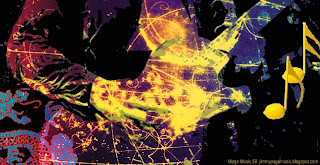With beauty before me, may I walk.
With beauty behind me, may I walk.
With beauty above me, may I walk.
With beauty all around me, may I walk.
~ Excerpt from the Navajo Night Way Ceremony
Mage Music 61
While beauty truly is in the eye (and ear) of the beholder, one thing that most people would agree to is that too much sameness is pretty darned boring, and that rule applies to what can be found in nature or in human-created works of art. It is contrast that makes the difference – but not in just any which way.
Balance is beautiful
Contrast is the difference in surroundings that makes the
contrasting thing stand out and be noticed.
Humans are quick to notice differences in patterns of
everything around them. Things that have
changed leap out and attract our attention, because evolutionary survival has
taught us that changed circumstances are often immediately followed by things
that leap out and make us dinner. This
ability to take note of changes in pattern is so important to survival that it
is an involuntary response of the brain. Our response to sudden change is
hardwired into us.
No one could survive, however, if they spent all their time
reacting to every change. There would be no
time for anything else in life. We tolerate lots of change in our daily lives just fine. Our brains don’t automatically shove us into involuntary survival mode every time there’s a difference in what we perceive. We need to take time to differentiate between bad things and good - after all, just because something changes doesn't mean we won't like it.
Being able to appreciate the contrasts in our environment, not just involuntarily run from them, is a good thing, too, because artists rely on contrast to
give life to their work.
Light and shade
Normal humans are most comfortable in a middle-ground of contrast, but we seek entertainment outside of the comfort zone. We look for the maximum difference that doesn't tip us over into the danger zone. We all flirt with discomfort and risk for fun and enjoyment to one degree or another. Contrast is interesting. We are attracted to it. Beauty happens when there is just the right amount of contrast, which means balance. Sameness may be pretty on the first go-round, but artfully balanced contrast will stand the test of time.
Jimmy Page refers to contrast as light and shade. These are terms for visual arts, but the terms obviously apply to music, too. The important thing for music and any form of art is to find the delicate point of balance between too much and too little, and when you are dealing with things that are not necessarily alike, it becomes a juggling act.
Balance is beautiful
We humans have an innate understanding of music. We know instinctively when various components satisfy intuitive benchmarks. We seek out pattern and completion, and we know when the contrasts are beautiful or boring. It’s not so easy to satisfy us though. The light and shade – contrast – that provides interest doesn't come from simple juxtaposition of opposites, which would be too predictable and therefore boring. Musical contrast doesn't come from just going from loud to soft, from fast to slow, from plain vanilla to heavy effects – it comes from mixing all possible combinations of musical values in contrasting patterns. Juggling, if you will.
Balance in art is a tricky thing. Great beauty comes from balancing on the edge of chaos – after all, juggling one tennis ball is not nearly as interesting as juggling a couple of raw eggs along with a sharp dagger or two.
When it comes to Magick, it’s even trickier.
Beauty in the heart of contrast
Consider how a downhill skier handles the many changing conditions there are on a run: Speed, slope, snow quality, obstacles, wind, and more. The skier finds an internal place of balance in the heart of the onslaught of new and constantly changing conditions, letting her body move around that center, rather than trying to move her center in reaction to the conditions. Knees flex, skis bounce, poles poke and drag, the body sways – a flurry of movement centered on a core of balance.
A Mage steps from what is now to what will be by dwelling in the quiet point of balance between the inner world of his own desire and will, and external reality. Walking in beauty is dwelling in the quiet heart of contrast.
I believe if you listen to the music of Jimmy Page, you will hear exactly what I'm talking about.











